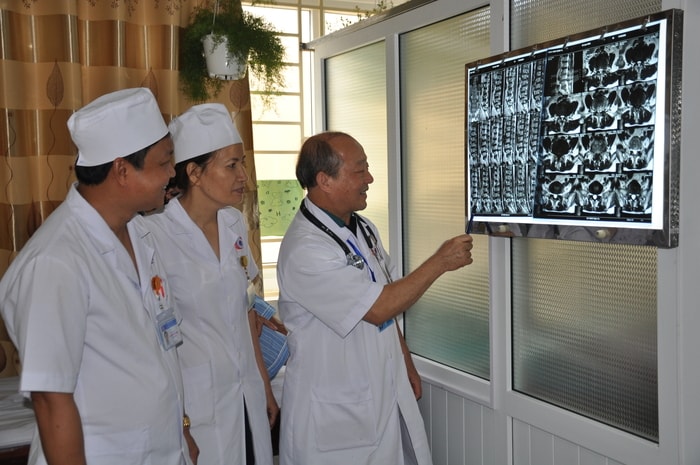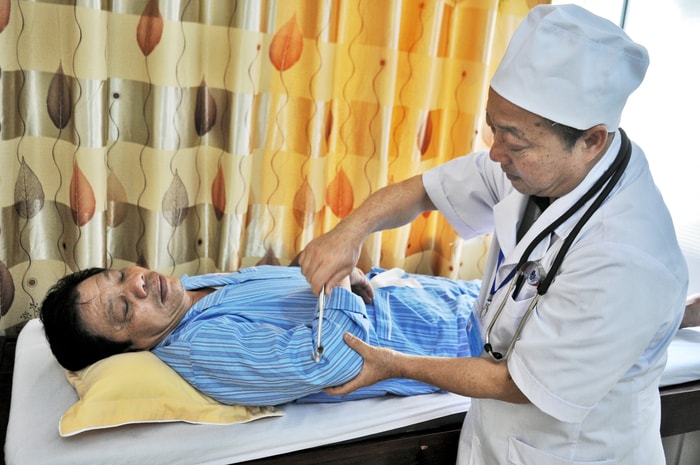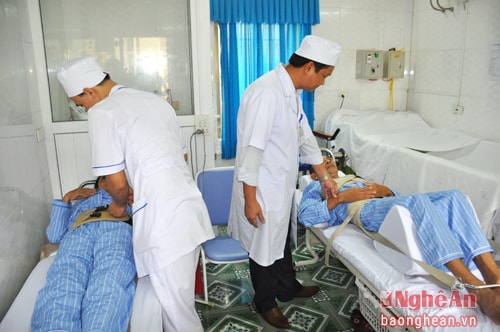Nghe An Rehabilitation Hospital: A trusted address in the treatment of sciatica
(Baonghean) - In recent times, Nghe An Rehabilitation Hospital has made continuous efforts to improve the quality of medical examination and treatment, successfully rehabilitating many complicated cases, including sciatica - one of the diseases that seems simple, but has unpredictable consequences. This has brought joy to many patients who come here for examination and treatment.
Consequences of sciatica
According to Master Thai Thi Xuan - Director of Nghe An Rehabilitation Hospital: Sciatica is a medical term describing pain along the sciatic nerve, pain in the lumbar spine radiating down the leg.
Sciatica is more common in men than in women and usually occurs between the ages of 30 and 50. There are many different causes affecting the origin and path of the sciatic nerve. Systemic causes are rare, while root damage causes account for 90-95%. However, the leading causes of sciatic nerve root compression are disc herniation, spondylolisthesis, spinal degeneration, and lumbar spinal stenosis. These groups of degenerative causes can be combined.
 |
| Leading professor shares experience with doctors of Nghe An Rehabilitation Hospital. Photo: Thanh Hien |
If the disease is not detected and treated early, it will cause harmful effects such as: the patient will feel pain right in the middle of the spine, then the pain spreads from the lower back down to one side of the buttocks, thighs and all the way to the heels, making the patient feel extremely uncomfortable.
Especially when leaning or being hit by something, the pain will become more intense. The most obvious phenomenon of stiffness is early in the morning after waking up, prolonged stiffness can cause strong muscle spasms, affecting the patient's health. At the same time, the patient's muscle spasms plus stiffness after a period of time can cause symptoms of atrophy of the buttocks, thighs, and calves to appear in the affected leg area.
The ability to move and walk is limited, because the patient will have pain from the waist to the hips, legs often and stiff joints, so activities such as walking, bending over are very difficult, even impossible. Sciatica is a sign of many other dangerous bone and joint diseases, such as: spinal stenosis, spinal tuberculosis, spinal cancer, spinal degeneration, spinal arthritis, disc inflammation...
In addition, there are some other effects such as numbness in the legs, loss of sensation, loss of urination and defecation response, body weakness, and a significant decrease in work quality. The harm caused by sciatica is not small, so as soon as the first symptoms of the disease are noticed, the patient should immediately go to a reputable medical facility for examination and treatment support as soon as possible.
Treatment methods
Currently, Nghe An Rehabilitation Hospital is treating sciatica very effectively by combining traditional medicine and modern medicine. This method has the ability to support the treatment of the root cause of the disease, thereby eliminating the symptoms of sciatica, without causing pain, without hospitalization, and without side effects. With this treatment method, the patient's long-term painful joints can be restored to normal.
Patient Nguyen Thi Ly (65 years old) in Thanh Khe, Thanh Chuong is being treated for sciatica at Nghe An Rehabilitation Hospital. The patient was admitted to the hospital with severe pain from the waist to the hips, stiff joints making it difficult to move around, reach for objects, etc., requiring assistance from relatives. The cause of the disease progression was due to subjectivity, initially there were aches and pains in the back spine but she did not go to the doctor immediately and still tried to go to work; only when the pain was too unbearable was she admitted to the hospital.
After a period of treatment at Nghe An Rehabilitation Hospital, patient Nguyen Thi Ly has improved a lot, her pain has reduced significantly, and she can take care of herself without the help of her family. The important thing is that the patient sleeps well (previously she was in pain all night and could not sleep).
 |
| Treatment for sciatica patients at Nghe An Rehabilitation Hospital. Photo: Thanh Hien |
As for patient Dinh Xuan Thang (Ngoc Son, Do Luong), he said: He is 45 years old this year but has spinal degeneration due to the consequences of prolonged sciatica that was not completely treated. After being treated in many places without success, he went to Nghe An Rehabilitation Hospital for treatment. Here, he was examined very carefully by doctors such as: MRI of the lumbar spine; electromyography... then treated with massage, infrared rays, spinal traction combined with machine exercises and taking medication according to the regimen. Currently, his condition has improved a lot.
For more effective treatment, Nghe An Rehabilitation Hospital has established a Pain Control Unit with the support of Professor Nguyen Van Chuong - Head of the Department of Neurology, Hospital 103, Neurology specialist of the Military Medical Institute, Executive Committee member of the Vietnam Neurology Association, Chairman of the Hanoi Pain Control Association. Professor Chuong said: In the treatment of sciatica, the most important thing is to accurately diagnose the cause of sciatica. From there, doctors can have appropriate treatment directions. At Nghe An Rehabilitation Hospital, patients will be treated with 2 methods:
First: Physical therapy and rehabilitation method, in this method the patient should rest absolutely in severe cases, lie on a hard bed, avoid lying on a hammock or sitting on a swing chair. Avoid vigorous movements such as sudden turns, running, jumping, bending over... At the same time, combine heat therapy to relieve pain, prevent muscle spasms, dilate blood vessels and enhance nutritional metabolism such as: Infrared, shortwave, ultrasound treatment; Farafine bundle, microcurrent pain relief, drug bundle, electromagnetic field; Electrolysis of drugs... Note: Do not use in cases of acute infection.
Second: Electrotherapy method, patients will receive electric pulses, electrolysis, TENS current, and interference current to stimulate neuromuscular, relieve pain, and increase metabolism.
 |
| Examination and treatment at Nghe An Rehabilitation Hospital. Photo: Thanh Hien |
Both of the above methods need to be combined with massage and soft tissue movement exercises in the lumbar region and affected legs. Through reflex and mechanical mechanisms, it has the effect of increasing circulation, nutrient metabolism and excretion, regulating the pathological process, relaxing deep muscles and joints, and reducing pain. Spinal traction can be performed manually in the acute phase or by traction machine in the subacute and chronic phase, applied 1-2 times/day, 15-20 minutes each time. Indicated in cases of spinal degeneration and disc herniation, it has the effect of reducing intra-articular pressure while stretching the ligament system around the joint, especially the posterior longitudinal ligament, reducing pressure on the nerve roots or discs. At the same time, it is combined with other appropriate exercises.
In addition, depending on the cause, it is necessary to combine antibiotics, immunosuppressants, etc. The patient will be prescribed a combination of three groups of non-steroidal anti-inflammatory drugs, pain relievers, and muscle relaxants.
Sciatica can become chronic, requiring a monthly or 3-monthly follow-up and re-examination plan to promptly detect deformities or worsening symptoms as well as change appropriate treatment methods.
SCIENTIFIC AND TECHNICAL COUNCIL - Nghe An Rehabilitation Hospital with the spirit: "All for the satisfaction of patients"; Is: "Where patients place their trust". Model: The first Green - Clean - Beautiful "Hospital - Hotel" in Nghe An * Address: No. 220, Binh Minh Street, Cua Lo Town, Nghe An * Contact phone number: Clinic phone number: 02383.949.709 - 24/7 hotline number: 02383.952.020 - Hotline number: 0966.251.414 - Hotline number: 0912.002.210 - Director phone number: 0912.487.568. |
Thanh Hien
| RELATED NEWS |
|---|

